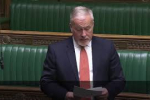The Ministry of Justice (MoJ) is piloting rapid deployment of offenders on Community Payback teams to clean up instances of littering, vandalism and fly-tipping, within 48 hours of it being reported to the probation service. The pilot will see offenders carry out up to 20,000 hours of hard graft in just 6 months, ensuring that they are paying for their crimes while giving back to the communities they have harmed.
Rapid deployment teams, made up of offenders serving Community Payback sentences and kitted out in high vis jackets as part of a new government plan to tackle the scourge of anti-social behaviour.
Richard Fuller MP said:
We're cracking down on anti-social behaviour and vandalism with new Rapid Deployment Teams. Offenders on Community Payback will clean up littering, vandalism and fly-tipping, within 48 hours of it being reported to the probation service.
This will mean eyesores are dealt with swiftly to restore community pride and ensure offenders are made to give back to the communities they have offended against.
Each year, courts hand down more than 50,000 Unpaid Work requirements to punish offenders for crimes including theft, criminal damage and alcohol-related incidents.
The Community Payback website will also be relaunched early next year, making it far easier for members of the public to report anti-social behaviour and nominate potential projects in their neighbourhoods. This will work alongside the government’s new reporting tool that will allow members of the public can quickly and easily report incidents of anti-social behaviour when they take place.
The payback pilot and the new reporting tool both form part of the government’s Anti-Social Behaviour Action Plan, published in March. This sets out how the government plans to crack down on these offences at a local level and give communities a greater say in how justice is served. The scheme will be piloted in the Probation Service regions of Greater Manchester, East of England, Wales and the North East. Wearing high-visibility jackets emblazoned with ‘Community Payback’ ensures offenders are seen to pay for their crimes while carrying out work that benefits the local community.
In May, a new law also came into effect requiring local probation services to consult annually with specific community leaders such as charities, victim organisations and elected policing bodies on the type of Unpaid Work that would benefit the region.
The government is investing up to £93 million into Community Payback which will see offenders completing millions of unpaid work each year to improve the environment and revitalise our towns and cities.
The public can at the moment nominate Community Payback projects in their local area at https://www.gov.uk/nominate-community-payback-project. The website will be relaunched early next year, making it easier for the public to report anti-social behaviour.

